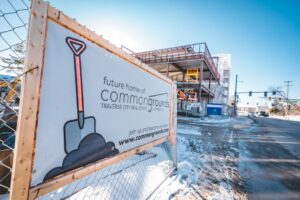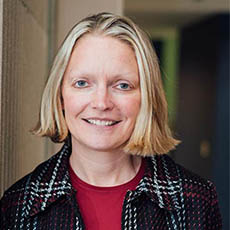This Guest Article for REVITALIZATION was written by Michele Wildman.
Thriving places help define a community’s economic vitality. From bike trails and pocket parks to vibrant shopping districts and lively urban centers, Michigan’s unique places attract and retain talent in local communities while contributing to a quality of life that is unmatched throughout the nation.
The Michigan Economic Development Corporation (MEDC) employs several innovative place-making approaches to partner with communities to create public spaces to drive impact. Two such approaches, crowdfunding and cooperatives, have successfully strengthened communities while spurring economic development statewide.
 Crowdfunding is the process of raising funds for a project from a large number of people.
Crowdfunding is the process of raising funds for a project from a large number of people.
Crowdfunding allows projects to access capital for costs they may have difficulty financing through traditional lenders by tapping into hometown pride, loyal patrons and others who have a personal interest in supporting gathering places in their community.
The Public Spaces, Community Places (PSCP) program is a first-of-its-kind public placemaking initiative. Designed by MEDC in collaboration with the Michigan Municipal League, PSCP is a crowdfunding initiative that can leverage matching grant funds through Patronicity, an online, crowdfunding platform.
PSCP projects focus on activating public spaces and community places and are designed to support projects that have established public awareness and local momentum. By meeting crowdfunding goals, projects can unlock a direct match through MEDC to bring these projects to life.
PSCP empowers local residents to be part of the development of transformational projects in their communities. Since PSCP was launched in June 2014, 275 projects have been successful in reaching their goal, with $9.9 million invested from 48,007 individual donors across the state.
Like crowdfunding, cooperatives put the community front and center in development and re-development.
Cooperatives are member-owned and -controlled businesses, in which all members have a say in the governance of the business. Cooperatives exist not only for the benefit of the members but to serve, strengthen, and sustain local communities. There are several exciting examples of new cooperatives statewide that are transforming underutilized spaces into projects that build community.
For example, Traverse City’s Commongrounds Cooperative will transform a vacant parking lot into a new four-story mixed-use cooperative with commercial businesses on the first and second floors and 25 residential units on the third and fourth floors.
The project, which includes a variety of green infrastructure, will bring affordable workforce housing and childcare to the community and will act as a catalyst for additional private investment and revitalization.
Investors in the project include commercial tenants as well as more than 500 local constituents as general co-op owners. With support through the state’s Michigan Community Revitalization Program, the Commongrounds project is expected to generate a total capital investment of $15.9 million and create 17 full-time equivalent jobs in the community.
Another exciting example is a new cooperative grocery store in Flint. The North Flint Food Market will provide walkable access to fresh and healthy food options to residents in the documented “food desert” on the city’s north side.
Supported by the Michigan Strategic Fund, the North Flint Reinvestment Corporation project will revitalize a long-vacant building and the cooperative model gives residents and supporters an opportunity to invest in their neighborhood. More than 900 member owners have already signed on to support the project.
It’s particularly exciting when a single project leverages both approaches. The Eastside Lansing Food Co-op (ELFCO) recently completed a crowdfunding campaign to open a market for local foods in Allen Neighborhood Center on Lansing’s Eastside.
ELFCO has a long history in the Lansing area, having operated in East Lansing for decades. This project will help ELFCO to re-open in its new home in the Allen Place Complex and will provide local farmers and food producers a year-round market for their goods, as well as a food innovation hub, incubator and accelerator kitchens for food entrepreneurs.
In Michigan, we continue to see great success statewide leveraging these grassroots-driven approaches to transform underutilized spaces into unique assets. It is ultimately these unique places that will help foster the vibrant, diverse and resilient communities where people want to live, work and play.
Interested in learning more about the MEDC’s community development initiatives? Visit miplace.org or sign up for the Community Development newsletter to stay up-to-date on program news and announcements.
NOTE: Michele originally published this article on LinkedIn. Reprinted here by permission.
Photos courtesy of Michele Wildman/MEDC.
About the Author:
 Michele Wildman is the Senior Vice President – Community Development at the Michigan Economic Development Corporation.
Michele Wildman is the Senior Vice President – Community Development at the Michigan Economic Development Corporation.
She is an experienced leader in the housing and community development industry with a demonstrated history of working in the administration of federal, state and local programs.
Wildman has a Bachelor’s Degree focused in Public Administration & Public Policy from Michigan State University and a Master’s Degree in Economics from Walsh College.

